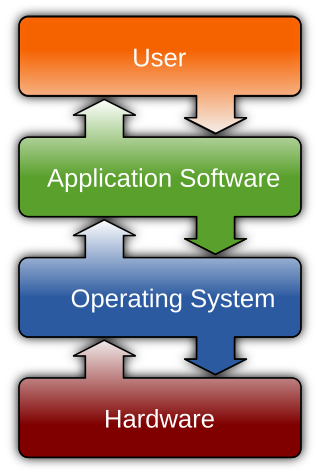
Software is a set of computer programs and associated documentation and data. This is in contrast to hardware, from which the system is built and which actually performs the work.

Computer science is the study of computation, information, and automation. Computer science spans theoretical disciplines to applied disciplines. Though more often considered an academic discipline, computer science is closely related to computer programming.
A computation is any type of arithmetic or non-arithmetic calculation that is well-defined. Common examples of computations are mathematical equations and computer algorithms.

An electronic calculator is typically a portable electronic device used to perform calculations, ranging from basic arithmetic to complex mathematics.
The graphical user interface, or GUI, is a form of user interface that allows users to interact with electronic devices through graphical icons and audio indicators such as primary notation, instead of text-based UIs, typed command labels or text navigation. GUIs were introduced in reaction to the perceived steep learning curve of command-line interfaces (CLIs), which require commands to be typed on a computer keyboard.

An operating system (OS) is system software that manages computer hardware and software resources, and provides common services for computer programs.
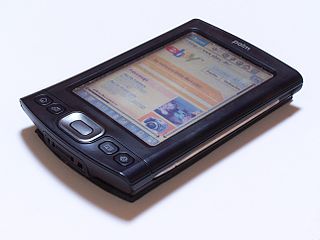
A personal digital assistant (PDA), also known as a handheld PC, is a variety mobile device which functions as a personal information manager. PDAs have been mostly displaced by the widespread adoption of highly capable smartphones, in particular those based on iOS and Android, seeing a rapid decline in use after 2007.
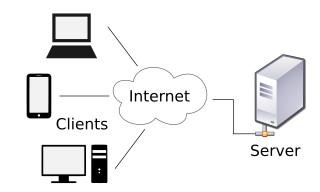
In computing, a server is a piece of computer hardware or software that provides functionality for other programs or devices, called "clients". This architecture is called the client–server model. Servers can provide various functionalities, often called "services", such as sharing data or resources among multiple clients or performing computations for a client. A single server can serve multiple clients, and a single client can use multiple servers. A client process may run on the same device or may connect over a network to a server on a different device. Typical servers are database servers, file servers, mail servers, print servers, web servers, game servers, and application servers.

A microcomputer is a small, relatively inexpensive computer having a central processing unit (CPU) made out of a microprocessor. The computer also includes memory and input/output (I/O) circuitry together mounted on a printed circuit board (PCB). Microcomputers became popular in the 1970s and 1980s with the advent of increasingly powerful microprocessors. The predecessors to these computers, mainframes and minicomputers, were comparatively much larger and more expensive. Many microcomputers are also personal computers. An early use of the term "personal computer" in 1962 predates microprocessor-based designs. (See "Personal Computer: Computers at Companies" reference below). A "microcomputer" used as an embedded control system may have no human-readable input and output devices. "Personal computer" may be used generically or may denote an IBM PC compatible machine.
A computer algebra system (CAS) or symbolic algebra system (SAS) is any mathematical software with the ability to manipulate mathematical expressions in a way similar to the traditional manual computations of mathematicians and scientists. The development of the computer algebra systems in the second half of the 20th century is part of the discipline of "computer algebra" or "symbolic computation", which has spurred work in algorithms over mathematical objects such as polynomials.

A graphing calculator is a handheld computer that is capable of plotting graphs, solving simultaneous equations, and performing other tasks with variables. Most popular graphing calculators are programmable calculators, allowing the user to create customized programs, typically for scientific, engineering or education applications. They have large screens that display several lines of text and calculations.

The history of computing is longer than the history of computing hardware and modern computing technology and includes the history of methods intended for pen and paper or for chalk and slate, with or without the aid of tables.
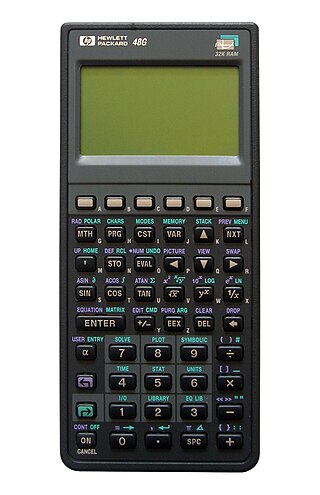
HP calculators are various calculators manufactured by the Hewlett-Packard company over the years.

NuCalc, also known as Graphing Calculator, is a computer software tool made by the company Pacific Tech. The tool can perform many graphing calculator functions. It can graph inequalities and vector fields, as well as functions in two, three, or four dimensions. It supports several different coordinate systems, and can solve equations. It is available for OS X and Microsoft Windows.

A mobile game, or smartphone game, is a video game that is typically played on a mobile phone. The term also refers to all games that are played on any portable device, including from mobile phone, tablet, PDA to handheld game console, portable media player or graphing calculator, with and without network availability. The earliest known game on a mobile phone was a Tetris variant on the Hagenuk MT-2000 device from 1994.

The history of computer science began long before the modern discipline of computer science, usually appearing in forms like mathematics or physics. Developments in previous centuries alluded to the discipline that we now know as computer science. This progression, from mechanical inventions and mathematical theories towards modern computer concepts and machines, led to the development of a major academic field, massive technological advancement across the Western world, and the basis of a massive worldwide trade and culture.
Programmable calculators are calculators that can automatically carry out a sequence of operations under control of a stored program. Most are Turing complete, and, as such, are theoretically general-purpose computers. However, their user interfaces and programming environments are specifically tailored to make performing small-scale numerical computations convenient, rather than general-purpose use.

A mechanical computer is a computer built from mechanical components such as levers and gears rather than electronic components. The most common examples are adding machines and mechanical counters, which use the turning of gears to increment output displays. More complex examples could carry out multiplication and division—Friden used a moving head which paused at each column—and even differential analysis. One model, the Ascota 170 accounting machine sold in the 1960s calculated square roots.
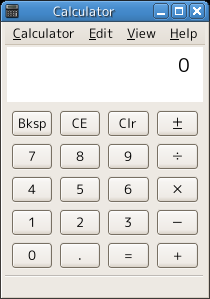
A software calculator is a calculator that has been implemented as a computer program, rather than as a physical hardware device.













